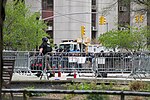Worth Street

Worth Street is a two-way street running roughly northwest-southeast in Manhattan, New York City. It runs from Hudson Street, TriBeCa, in the west to Chatham Square in Chinatown in the east. Past Chatham Square, the roadway continues as Oliver Street, a north-south street running one-way northbound. Between West Broadway and Church Street, Worth Street is also known as Justice John M. Harlan Way in honor of the Supreme Court justice and alumnus of the nearby New York Law School. Between Centre and Baxter Streets, Worth Street is also known as the "Avenue of the Strongest", "New York's Strongest" being a nickname for the city's Department of Sanitation.The western end of Worth Street, between Hudson Street and West Broadway, abuts 60 Hudson Street, the former Western Union headquarters that later was converted into an internet hub. Worth Street passes through the cluster of government offices and courthouses centered on Foley Square. 125 Worth Street (at Centre Street) houses the headquarters of the New York City Health and Hospitals Corporation, the Department of Health and Mental Hygiene, and the Department of Sanitation. Additionally, the New York Supreme Court courthouses at 60 Centre Street and 80 Centre Street (the Louis J. Lefkowitz Building) and the Daniel Patrick Moynihan Federal Courthouse (Southern District of New York) at 500 Pearl Street all have entrances facing Worth Street.
Excerpt from the Wikipedia article Worth Street (License: CC BY-SA 3.0, Authors, Images).Worth Street
Worth Street, New York Manhattan
Geographical coordinates (GPS) Address Nearby Places Show on map
Geographical coordinates (GPS)
| Latitude | Longitude |
|---|---|
| N 40.715416666667 ° | E -74.002763888889 ° |
Address
Abraham De Peyster
Worth Street
10013 New York, Manhattan
New York, United States
Open on Google Maps









